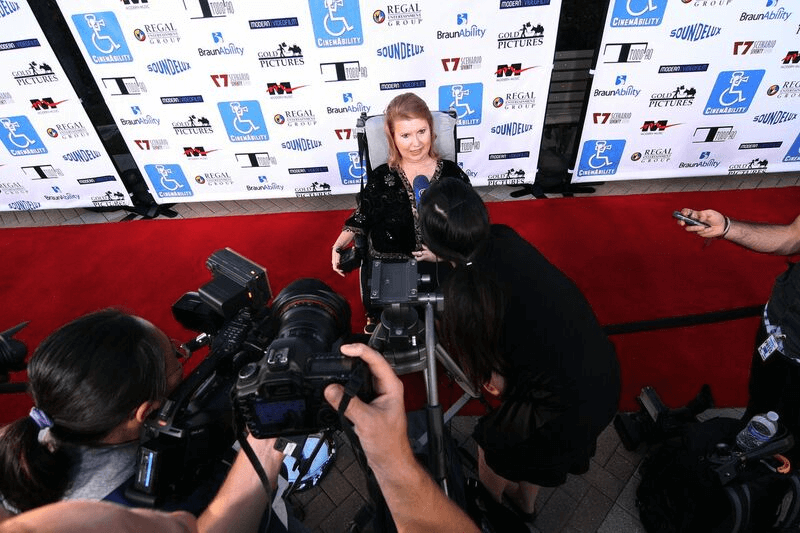Jenni Gold has been writing, directing and producing film shorts, movies and TV shows for more than 20 years. She’ll tell you, since she was a kid making movies with a Hi8 camcorder, she’s been in love with Hollywood for a lot longer.

She’ll also tell you there’s a problem with it.
It’s failing the Gold Test.
Based on the Bechdel Test, which evaluates filmed content based on whether it contains at least two women talking to each other about something other than a man, Jenni’s own Gold Test began with one simple criterion: Does this content contain a disabled character who is not defined by that disability?
“I realized that 90 percent of films and TV shows don’t really have anybody who is disabled at all, not even in the background,” Jenni says. “That means we don’t exist in the society of that film or that TV show. If you don’t exist, how do you get a seat at the table?”
Jenni, who lives with spinal muscular atrophy (SMA) type 2, lowered the bar. The new Gold Test: Is anyone with any disability at all in the background anywhere in the universe of a film or TV show?
That’s the question at the heart of Jenni’s new documentary, “Cinemability: The Art of Inclusion,” which is both a retrospective of Hollywood’s portrayals of disability and a challenge to the industry to include more realistic depictions of disabled people and to offer disabled actors, directors and producers equal opportunities for work. The documentary includes interviews with a number of actors with disabilities who are often typecast or even mocked within the context of a story.
“I think we have two problems,” Jenni says. “One is that the disability community is segmented. We don’t fight together for common goals. I wanted to make sure we covered everything we possibly could [in “Cinemability”] because the conversation has to be about including everybody.
“The other thing,” she says, “is that the general public doesn’t want to think about people with disabilities. It makes them realize their own fragility — at any moment, they could join the club, and it’s not a club they want to join.”
Typical cinematic portrayals of disability present it as only a bad thing, Jenni says, and often a reason to stop living. She cites several popular and award-winning movies, including “Me Before You” and “Million Dollar Baby” as two top offenders.
“The idea that a disability means you should kill yourself is appalling, but it’s still embraced,” Jenni says. “’Million Dollar Baby’ was nominated for Oscars and no one even noticed. It’s not [the disability community] that is noticing something’s wrong. Something’s just wrong.”
The best portrayals, Jenni says, are those that are truest to life — Flynn, Walter White’s son on “Breaking Bad,” for example, or Mark Jarvis, a cool guy in a wheelchair who got in the way of Jason in “Friday the 13th Part 2.”

Jenni, who is the only female wheelchair-using director member of the Directors Guild of America, attended film school and the University of Central Florida and co-founded her own film development and production company, Gold Pictures Inc., in 2001. She says when she started working on “Cinemability” more than a decade ago, it felt ahead of the curve. Now, she says, it seems like society has caught up with this conversation.
“Even in the film, some of our celebrities had revelations while talking to me,” Jenni says. “I hope that it really impacts the industry. I have a lot of friends who are actors with disabilities who should be able to audition for any role — the grocer, the lawyer, the banker, the neighbor, the mom. They should have the same right to be looked at for anything and then get those roles.
“And the stories,” she says, “don’t just have to be about that disability triumph of some sort. It can just be part of life. I’m not saying you have to have every disability included in every movie, but just a reasonable amount that is in line with the makeup of our world. Then you’re in the world. You exist. You’re not an oddity. You have the same love, the same desires. It makes the storytelling richer and more diverse and more real.”
Find out more about “Cinemability: The Art of Inclusion” here, and find it for download it on iTunes, Amazon and GooglePlay.
